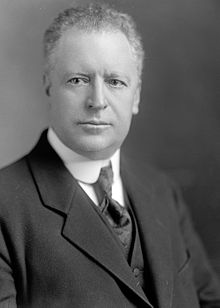Victor Murdock
Victor Murdock | |
|---|---|
 | |
| Member of the U.S. House of Representatives from Kansas | |
| In office May 26, 1903 – March 4, 1915 | |
| Preceded by | Chester I. Long |
| Succeeded by | William Augustus Ayres |
| Constituency | 7th district (1903–07) 8th district (1907–15) |
| Personal details | |
| Born | March 18, 1871 Burlingame, Kansas, U.S. |
| Died | July 8, 1945 (aged 74) Wichita, Kansas |
| Political party | Republican |
| Other political affiliations | Progressive Party |
| Spouse(s) | Mary Pearl Allen |
| Children | 2 |
| Mother | Victoria Mayberry Murdock |
| Father | Marshall Murdock |
Victor Murdock (March 18, 1871 – July 8, 1945) was an American politician and newspaper editor who served as a U.S. Representative from Kansas.
Life[]
Victor Murdock was born March 18, 1871, in Burlingame, Kansas to Marshall Murdock, editor of the Osage County Chronicle, and Victoria Mayberry Murdock. In 1872, the family moved to Wichita, where Victor Murdock received his common school education, began learning the printing trade, and at age 15 became a reporter. In 1890, he married Mary Pearl Allen, spent some time in Chicago where he worked on the Inter-Ocean, and then in 1894 became managing editor of the Wichita Eagle until 1903.[1] In 1892 he reported on Representative and future president William McKinley's campaign for governor of Ohio.[2]
Murdock was covering the Kansas legislature when he decided to run for a vacancy in the United States House of Representatives and was elected to follow Chester I. Long, who had resigned to take a Senate seat, on May 26, 1903, taking office on November 9, 1903. During the 1912 United States presidential election he left the Republican Party to support and join former President Theodore Roosevelt's Progressive Party and was the party's choice for Speaker of the House in 1912. Murdock served in Congress until March 3, 1915.
He was elected as chairman of the Progressive Party in 1914 and 1916.[3][4] In 1916, when Theodore Roosevelt refused to run, the Progressive Party nominated Murdock for president, but he did not appear on the ballot. Murdock worked as a war correspondent in 1916, in 1917 he was appointed to the Federal Trade Commission by President Woodrow Wilson and served until his resignation in 1924 to become the editor for The Wichita Eagle until his death in Wichita on July 8, 1945.[5]
References[]
- United States Congress. "Victor Murdock (id: M001083)". Biographical Directory of the United States Congress.
- ^ "Victor Murdock, Veteran Kansas Publisher, Dies". The Iola Register. 9 July 1945. p. 1. Archived from the original on 8 December 2019 – via Newspapers.com.
- ^ "Victor Murdock, Editor Of Wichita Eagle, Dies". The Emporia Gazette. 9 July 1945. p. 5. Archived from the original on 8 December 2019 – via Newspapers.com.
- ^ "No Going Back". The Potter Enterprise. 30 September 1914. p. 6. Archived from the original on 8 December 2019 – via Newspapers.com.
- ^ "Will Reconvene June 26". The Neenah Daily Times. 12 June 1916. p. 2. Archived from the original on 8 December 2019 – via Newspapers.com.
- ^ "Victor Murdock, Editor-Owner Of Wichita Eagle Dies At 74". The Cushing Daily Citizen. 9 July 1945. p. 2. Archived from the original on 8 December 2019 – via Newspapers.com.
External links[]
- 1871 births
- 1945 deaths
- People from Burlingame, Kansas
- Politicians from Wichita, Kansas
- American newspaper reporters and correspondents
- Kansas Progressives (1912)
- Kansas Republicans
- Members of the United States House of Representatives from Kansas
- American war correspondents
- American newspaper editors
- Republican Party members of the United States House of Representatives
- Federal Trade Commission personnel
- Woodrow Wilson administration personnel
- Harding administration personnel


